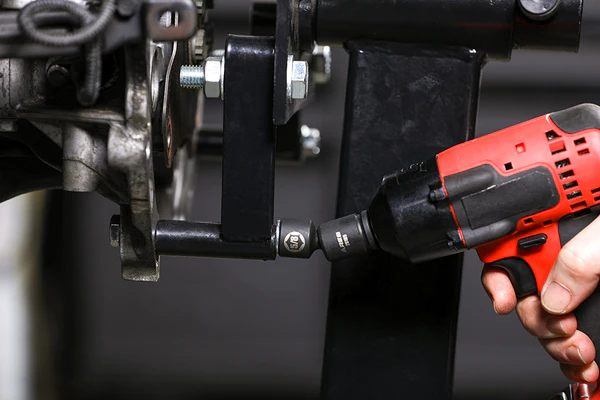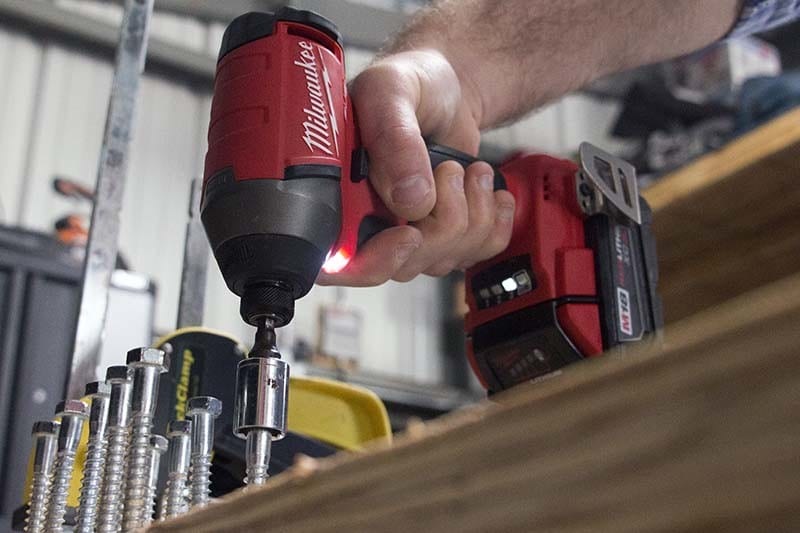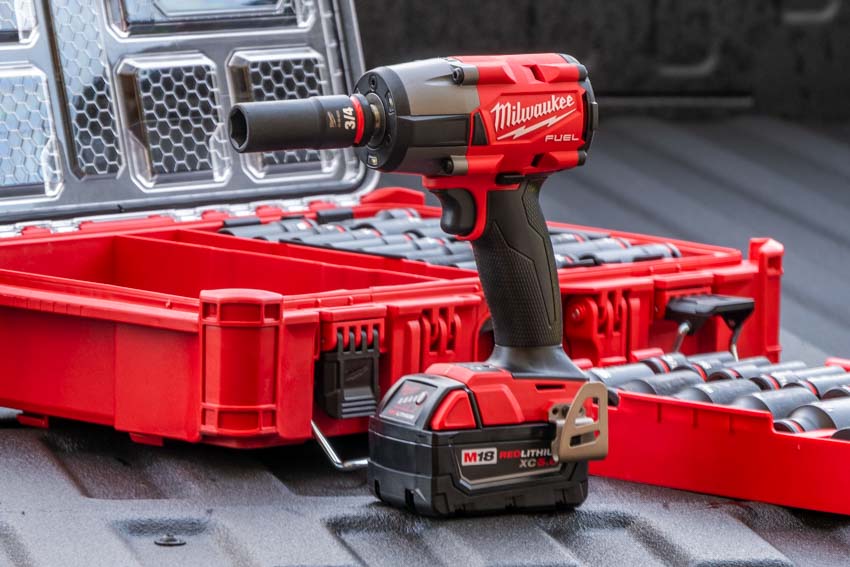Impact drivers are powerful cordless tools that can drive screws and bolts with tremendous twisting force. Their high torque allows them to accomplish tasks that regular drills struggle with. However, this power comes at a price – you need to use impact-rated accessories that are designed and tested to withstand the forces. So, can you use regular sockets on an impact driver?
The Quick Answer
No, you should not use regular sockets on an impact driver. Regular chrome sockets are more likely to crack or shatter under the sheer torque of an impact driver. To safely use sockets with an impact driver, you need impact-rated sockets made of hardened materials like chrome vanadium or chrome molybdenum.
While you may get away with using a regular socket once in a while, it’s generally risky and not recommended. The powerful hammering action that allows impact drivers to deliver such high torque can easily damage regular sockets not designed for such forces.
What Is an Impact Driver and How Is It Different?
Before we discuss sockets, let’s clearly define what an impact driver is and what makes it unique.
An impact driver is a powerful cordless tool used to drive screws, bolts, and other fasteners. It delivers a tremendous amount of torque in quick “impacts”, allowing it to drive fasteners that may be too difficult for a standard drill.
The key difference lies in the internal mechanism. An impact driver uses a hammer and anvil design. An electric motor spins a hammer which strikes the anvil repeatedly, generating a huge amount of rotational force. This allows the tool to deliver upwards of 1,000 to 1,500 inch-pounds of torque!
In comparison, a standard drill/driver works very differently. It uses a simple gear reduction system to produce torque – sufficient for drilling holes and driving small screws, but not enough for tough fastening applications.
So in summary – the rapid hammering action inside an impact driver results in tremendous twisting force capable of driving large fasteners quickly. But this same force can wreak havoc on sockets not designed for such punishment!

Why Shouldn’t You Use Regular Sockets on an Impact Driver?
There are a few key risks involved in using regular chrome sockets on an impact driver:
Risk of Socket Cracking or Shattering
The foremost reason to avoid regular sockets is the risk of cracking or shattering under load.
Most regular sockets are made from chrome vanadium steel or similar alloys. While rugged, they simply cannot handle the extreme torque and concussive forces produced inside an impact driver. They can develop hairline cracks or even fragment violently, becoming dangerous projectiles.
Impact drivers can output well over 1,000 ft-lbs of nut-busting torque. This figure can spike much higher depending on several factors. Such massive mechanical force can literally rip sockets apart!
Can Damage Lug Nuts and Bolts
When a regular socket fails, it’s not just the socket that gets damaged. The fastener itself like a bolt or lug nut can get rounded off or warped.
If a regular socket cracks under torque, it will lose its original shape and size to grip the edges of the bolt properly. As the impact wrench keeps spinning, the malformed socket chews up the corners of the bolt head, leaving it permanently rounded off and unusable.
Replacing damaged lug nuts and bolts is inconvenient, not to mention an unnecessary cost. Using proper impact-rated sockets prevents such problems in the first place.
Can Be Dangerous
Last but not least, shattering chrome sockets can cause serious injuries, especially to your eyes and face. The risk is real given that impact drivers are one of the most powerful handheld tools around.
Socket fragments ejecting violently from an impact gun is extremely dangerous. On top of injuries, the broken shards can also damage the surface you’re working on. It’s simply not worth the risk to use regular sockets instead of impact-rated ones designed specifically for high torque tools.
Signs That You Are Using the Wrong Sockets
Wondering if your sockets can handle impact driver forces safely? Watch out for these signs:
- The socket feels too snug/tight when fitting onto bolts. Proper impact sockets have slightly looser tolerances.
- You see small crack lines forming near the driveline broached hole.
- The impact gun slows down significantly during bolt tightening/loosening.
- Sockets get stuck to the bolt head frequently.
- You notice metal fragments near the work area after extended use.
- Sockets get very hot after use – the material can’t handle the torque.
Any of these signs means your sockets are taking an unnecessary beating. Impact forces eventually cause microscopic metal fatigue and tool failure.
The only permanent solution is to invest in sturdy, high quality impact sockets rated for impact wrenches and drivers.
When Can You Use Regular Sockets?
You don’t necessarily have to throw away your existing regular chrome sockets. Here are some appropriate uses for non impact-rated sockets:
Light Duty Power Drills – Regular sockets work reasonably well with standard power drills meant for driving small to medium screws. Most produce less than 200 inch-lbs of torque which socket alloys can withstand without failing. So you need impact sockets only for high torque fastening work.
Manual Ratchet Use – It’s perfectly safe to use chrome vanadium sockets with traditional manual ratchet wrenches. The torque levels generated manually will never be high enough to damage quality sockets. So save your manual sockets for hand ratcheting applications only.
Pneumatic Impact Wrenches – Surprisingly, you can often get away with using regular sockets on air-powered impact wrenches, especially the smaller fractional drive sizes. The maximum torque output is lower compared to electric models. However, eventual socket failure is likely unless you use branded air impact sockets.
Always check the socket manufacturer’s guidelines to see if particular models tolerate impact use. When in doubt, choose sockets specifically rated for high impacts to maximize safety and longevity.

Choosing the Right Impact-Rated Sockets
Now let’s discuss how to pick quality impact sockets approved for high torque electric power tools:
1. Material Used – The foremost factor is composition of the socket alloy. Look for hardened chrome molybdenum steel or similar ultra-strong alloys. These can handle repeated high-torque impulses without cracking or distorting permanently.
2. Impact Rating – Socket sets designed for impact use will have an explicit “impact rated” certification printed conspicuously on the packaging. This indicates suitability for electric/pneumatic impact drivers outputting 500+ ft-lbs of torque.
3. Performance Testing – Reputed brands use advanced hydraulic testing rigs to validate the design. Impact sockets undergo thousands of tightening/loosening cycles with increasing torque loads before getting approved.
4. Warranty Coverage – Many premium impact socket manufacturers offer warranties against breakage, even if you use them improperly with overpowered impact guns. This provides peace of mind for DIY enthusiasts.
In short, buy sockets specifically branded and marketed as “impact rated”. While costlier than regular sockets, they provide the proper durability and safety margins for an impact driver’s strenuous functioning.
Impact Sockets vs Regular Sockets – What’s the Difference?
What makes impact sockets so resilient against cracking? Here are the key internal differences in design:
- Thicker Walls – Impact sockets have up to 30% thicker walls to prevent distortion under extreme radial loading caused during each torque impulse.
- Beveled Edges – They incorporate slight chamfered edges and fillets in the gripping end. This allows smoother engagement with fastener heads and better torque transfer.
- Hardened Steel Alloy – Special treatment and tempering of ultra-strong chrome molybdenum steel makes it far less likely to shatter. The molecular structure changes to handle repeated shocks.
- Enlarged Broach – The female square driveline hole is intentionally made larger/broader. This extra breathing room enables the fast, high force impacts to dissipate without cracking the steel.
- Black Phosphate/OX – Most impact sockets feature a protective black phosphate or black oxide coating. This treatment further relieves internal stress and enhances durability during rigorous use.
In a nutshell, everything from the choice of base material to the physical dimensions and protective coatings contribute to a socket’s compatibility and longevity with high-torque impact drivers.
Impact-Rated Accessories for Impact Drivers
It’s not just sockets – any accessory used with an impact driver should have an explicit impact rating as per the tool manufacturer. These include:
- Impact Extension Bars – Use hardened steel extensions (3-6 inches long) to comfortably reach recessed tightening points.
- Impact Universal Joints – Extreme torque can bend ordinary joints permanently. Get U-joints made of durable chrome vanadium.
- Impact Screwdriver Bits – Special impact-rated driver bits are available for installing/removing fasteners. Look for S2 steel composition.
- Impact Socket Adaptors – Use ultra-durable adaptors to broaden socket type/size compatibility with your impact driver.
- Impact Screwdriver Bit Holders – For frequent bit changing needs, invest in a metal bit holder labeled as suitable for high torque usage.
Using the right accessories drastically lowers any safety risks while giving you the full benefits of your cordless impact driver’s capabilities!
Frequently Asked Questions (FAQ’s)
Can I Use Manual Sockets on an Impact Driver?
It’s risky to use non impact-rated chrome sockets with an impact driver, including manual sockets. The extreme twisting forces generated can ultimately crack or shatter any regular socket. For trouble-free functioning, always pair your impact driver with accessories explicitly impact rated.
What Happens If You Use Regular Sockets on an Impact Wrench?
Impact wrenches are even more powerful than impact drivers, outputting 1,000+ ft-lbs of nut-busting torque quite easily. This makes it downright dangerous to use ordinary sockets on an impact wrench. At the very minimum, expect them to get permanently rounded or dysfunctional after a few uses as they fail to handle the sheer forces. In the worst case, cracking and fragmentation can cause socket pieces to act as dangerous shrapnel. Invest in durable impact sockets rated for maximum torque for reliable and safe performance.
Conclusion
We hope this detailed guide has cleared your doubts about using regular sockets with an impact driver. To summarize – it’s risky business that can damage sockets, bolts, as well as lead to injuries. Spend a little extra on robust impact-rated sockets explicitly designed for the extreme twisting impulse forces. This future-proofs your socket set investment while enabling incredible productivity from your impact driver!
Have more questions about socket compatibility for impact tools? Drop me a comment below!
